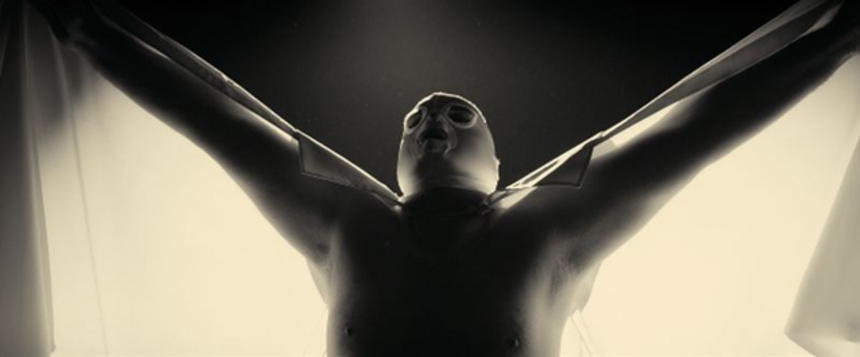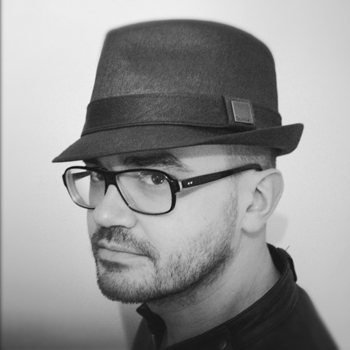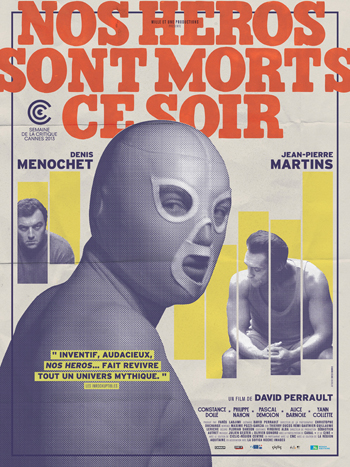Strasbourg 2013 Interview: David Perrault On His Film OUR HEROES DIED TONIGHT

One of my biggest discoveries at last year's Strasbourg Fantastic Film Festival, and subsequent favorite films of 2013, was David Perrault's Our Heroes Died Tonight (aka Our Heroes Are Dead Tonight). The film, as one French critic called it, is a 'generous declaration of love to cinema', which sounds about right.
Masked wrestlers tussling with gangsters and love in the in the black and white Paris of film history, I suppose, is another way to describe it, although that has basically the same effect. Perrault's film is in the long tradition of French riffs on American genre, where the struggles in bistros and bedrooms are given equal weight to those in the ring. It brought the house down in Strasbourg.
It did.
Masks always fascinated me. They fired up my imagination, made me think about identity, and as a director, I simply found them visually interesting. Somehow, a lot of films that made me fall in love with cinema featured masks as well. Films like Phantom of the Paradise, Halloween, Eyes Wide Shut. I ate it up.
So I stumbled on this picture where you saw a masked wrestler, sitting at a zinc bar in a typically Parisian bistro, sipping his red wine with a straw, and it blew me away. It looked like something out of a superhero movie directed by Jean Pierre Melville. As if a comic book character had ended up in a film noir. And that's it; I knew there was a film, so I started writing the script.
Getting funding for the film was a little bit more difficult, as you can imagine. It's in no way the image of your standard first film in France, recently a little autobiographical drama, naturalistic in style, etc. It took a lot of convincing, and just about five years of work to get this wrestling film noir made.
There's no doubt about the originality of the juxtaposition, and the references in the film go deep, but what was the process like tempering that to make the film accessible to the widest possible public?
The most important thing was to make sure we weren't making a film for a happy few, you know, for only a select group of cinephiles. It makes me kind of sad when people disparage the film as just a collection of references. I've often said, all the films I love and my many inspirations emerge within the work, but it is above all a story about people. The heart of the film is the kind of mysterious friendship shared between the two main characters.
As the look is very stark and visually stylized, we couldn't allow the story to become too conceptual. It had to stay human and real.
One of the ways we got that is through casting. It helps to have these great actors. Another way was to invert a lot of the stereotypes you would normally expect. One of the archetypes of the B-movie, or the crime thriller, is that of the strong and virile man. And they are that way in the film too, but that virility is called into question through their relationships with the women in their lives. Contrary to a lot of film noirs, the women are neither damsels-in-distress nor femme fatales. Just fully functioning, well-rounded adults. Don't get me wrong, it absolutely is a film noir, but hopefully one told through a more modern point-of-view.
That idea of 'modernist noir' is reflected in the visual texture of the film as well. One of the things that really strikes people is the crystalline, 'more real-than-real' look of HD black and white.

And that was a real choice. We thought about that question, the DP and I, about that question of grain. We shot the film in HD with the Arri Alexa camera, and you know, in postproduction now you can do anything, including recreating the film grain of 35mm. So we were sitting, going back and forth on the question, "should we simulate grain, should we not?" Finally I decided against adding anything because I didn't want the film to feel like a pastiche. I didn't want it to be a copy of those 1940s and 50's films, but rather a dream of one. I wanted it to stand as an oneiric, reflection on those films, so we decided to go as for in the other direction as possible. Instead, in post we sought to create a look as pure and scrubbed of grain as possible. I think the visuals have a chrome-like, almost shimmering feel, which reinforces the film's nature as a thoroughly modern reflection of the past.
Among the cast, both leads Denis Menochet and Jean-Pierre Martins, and actress Alice Barnole are all best known for roles they played in other period/historic films. (Martins as the 1940s boxer Marcel Cerdan in LA VIE EN ROSE, Menochet as the interrogated farmer in INGLOURIOUS BASTERDS, and Barnole as a Belle Époque prostitute in HOUSE OF TOLERANCE) How much was their casting a kind of conscious choice at evoking the past?
I dislike, in what we can call 'costume dramas', that feeling that everybody is playing dress-up. It's important to believe that people actually exist in a time and place, and so you need actors who can sell that. Actors who are... à l'ancienne.
Tarantino, for example, called Denis Menochet 'the French Robert Mitchum'. He has old world vibe to him, that's all you can say. You take one look at him, and you believe that kind of guy could have existed in the 1960s. It's not even about performance, really. It's a physical charisma. He walks into the shot and immediately the camera picks it up, before he even says a word.
I sought that out in all of my actors, because I had free reign to cast how I pleased. That is not always the case; sometimes you're pushed to look at somebody in particular. I always had Menochet and Martins in mind for these characters. I knew it was them, because it could have only been them.
The centrepiece of the film is throw-down match between the Martins and Menochet. What are the complications that arise when staging and shooting wrestling?
There are a lot.
First off, I didn't want the matches to look exactly like they did at the time. If we recreated a real fight it would have been very long and annoying for the audience. So we needed to balance verisimilitude with action and excitement.

And then was the fact that we had no stunt doubles. It was the real actors performing the fights, so if they got hurt, which they did, it would really set us back. But it was important to have the two leads perform the fights themselves. That fight is one that required a lot of energy and is very important for the story, in a way I think it sums up the whole film, being both very physical and somewhat lyrical too, and, without giving anything away, about the nature of their friendship, so we needed to be able to follow the actors all the way through.
Finally, there is the way that the scene starts in a more or less realist way, very physical, and as it goes on we get the feeling we are entering into Denis Menochet's head, where it assumes a nightmarish quality. That was something that I dealt with more in editing than in shooting, though.
Strangely, for all the difficulties there, I found the action much easier to shoot than the scenes of pure dialogue. When you're shooting dialogue, you have to pay really close attention to every detail, to intonations and background characters and how much liquid is in somebody's glass, and then reset for the next take. I shoot a lot of takes. It can be exhausting. Action, on the other hand, is kinetic. Once it starts, you just have to jump in and capture the moment and use the energy to push through. It can be a good deal easier!
I don't want to get too bogged down in citing references and inspirations, but one that really stood out for me, with regards to the central friendship, was not even a film at all, but John Steinbeck's OF MICE AND MEN...
It's very funny you should say that. I had not even thought of that when writing the script. But Denis, when he read the script - his character, Victor, is kind of a mystery. He's very strange, we're not sure if he's a psychopath, or very infantile or touched - him, his reference for making sense of it was Lenny in Of Mice and Men. So he'll be happy you said that.
It's not just the similarities between Lenny/Victor though. Both are revolve around very comparable relationships, these friendships between a cynic, a word-weary guy, and an innocent. Both times the cynics end up having to protect the innocent brute.
In some ways, without the innocent, the cynic wouldn't be able to exist. It's a very deep interplay. People say, "well what are they even doing together? They have nothing in common." But that's the way life is. We find ourselves in strange circumstances.
In Of Mice and Men you have a similar story. You have a character who is very strict and authoritarian, and is always yelling at and getting fed up with his friend, but in the end you realize that's how he's figured out how to exist. He spends his time berating his friend, but that is his way of life.
In preparing for the role, Denis actually had two influences. One was Of Mice and Men and the other was "The Horla" by Guy de Maupassant, which I highly recommend. It's a short story about a man who feels he always has someone behind him, like he's being chased by something unseen. Often in the film, especially while wearing the mask, we'll sense that something is pushing him from behind, that he's being overtaken by this invisible energy. I guess that's one of the more fantastical elements of his character.
 The film is interested in myth-making, and is set in a heightened world. To what extent does the wrestle-crazy Paris fit into that? Was le catch really the phenomenon you depicted it as in the 1960s?
The film is interested in myth-making, and is set in a heightened world. To what extent does the wrestle-crazy Paris fit into that? Was le catch really the phenomenon you depicted it as in the 1960s? Oh, yeah. It was the most popular sport in France at the time. Everyone would watch it on TV.
The wrestler we allude to in the film, The White Angel, was a real guy. He wore a white mask and inspired our character, The Specter.
He was really extremely famous at the time. When I started doing research for the script I was taken aback. I found these popular magazines and TV guides from the era, and you had The White Angel prominently on the cover, right there with all the famous personalities of the day. Whenever I spoke to someone who grew up then, they all remembered. But it's like everybody else forgot.
It kind of mysterious ended in the 1970s, more or less replaced by soccer in the public consciousness. It's still big in the US, of course, and the lucha libre in Mexico. So I think it does say something about the French spectator, about what we're willing to accept, or not, in our popular entertainment. That archetypal, Good vs. Evil struggle is something we very much don't have in our cinema.
And strangely, there never was a single film about le catch at the time. They're images that are completely forgotten.
One of the things that is mythologized both in this film, and in many others, is the city of Paris itself. At one point here, one of the villains gives an evil monologue about... the history of Paris metro station names. It would seem ridiculous if it wasn't something that could occur in everyday conversation there. (A series of best-selling books and popular TV specials in France are about exactly that.) Could you talk a little about the role of Paris as a sort of heightened space?
Recently, Paris has become a flawed city, in that it is now very much a museum to itself. But at the same time, it has become that on the basis of its incredible history, a history that lights up the imaginations of so many people. It is something of a dream box, really. When you live there day to day, you lose sight of that. Then when you're abroad, and people talk to you about the city, and its different arrondissements, and they have such a personal stake in it, you are very quickly reminded.
With the film, it was important to revive that dream box feeling, to recreate the Paris of classic films, of the New Wave and that era. When I'd go abroad and mention French cinema, people loved to talk about Jean-Pierre Melville and Jean-Luc Goddard, directors who put the city at the forefront of their films, where the streets were characters in the film. I wanted to access the feelings of those films, and Paris is a part of that. I wanted to make a film about the many subjects people fantasize about, that includes wrestlers and gangsters, but also the streets and sites and history of Paris.
I do the same thing. The first time I went to New York, I had the impression I was in a never-ending film. I felt like I knew the city, whereas I had never before been. Paris, I think, has the same effect.

Do you feel this content is inappropriate or infringes upon your rights? Click here to report it, or see our DMCA policy.






